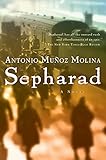 This past summer I fell into the dream of reading as on a train; I was disembodied and purely receptive to Sepharad by Antonio Munoz Molina. His is a narrative “that pretend(s) to be stories told during a journey.” Against the backgrounds of the Sephardic diaspora, the Holocaust, and Stalin’s purges, “among the masses fleeing,” are Primo Levi and Kafka, real characters with stories: Willi Munzenberg’s, he with the missing wife, “she too tiny a figure among the fleeing multitudes.” This highly recursive novel “sends out ripples of concentric rings that affect succeeding discoveries.” Elements of W.G. Sebald are here. Munoz Molina’s is a gray palate; nothing is a favorite word. The writers share themes of displacement and loss. “They disappear one day,” Munoz Molina writes. “They are lost, erased forever, as if they had died, as if they had died so many years ago that they are no longer in anyone’s memory and there is no sign they were ever in this world.” The difference between the two writers — for this reader, at least — is the sensation of messy life in Munoz Molina, elements of sensuality and mystery: “One night while he is waiting for his wife… he sees a blonde woman lying on a bed in a room on the other side of the patio.” The woman, too far away for features, turns into the “the blond, barefoot foreigner on the steps of a train one early summer night long ago.” Lovely divagations next door to death.
This past summer I fell into the dream of reading as on a train; I was disembodied and purely receptive to Sepharad by Antonio Munoz Molina. His is a narrative “that pretend(s) to be stories told during a journey.” Against the backgrounds of the Sephardic diaspora, the Holocaust, and Stalin’s purges, “among the masses fleeing,” are Primo Levi and Kafka, real characters with stories: Willi Munzenberg’s, he with the missing wife, “she too tiny a figure among the fleeing multitudes.” This highly recursive novel “sends out ripples of concentric rings that affect succeeding discoveries.” Elements of W.G. Sebald are here. Munoz Molina’s is a gray palate; nothing is a favorite word. The writers share themes of displacement and loss. “They disappear one day,” Munoz Molina writes. “They are lost, erased forever, as if they had died, as if they had died so many years ago that they are no longer in anyone’s memory and there is no sign they were ever in this world.” The difference between the two writers — for this reader, at least — is the sensation of messy life in Munoz Molina, elements of sensuality and mystery: “One night while he is waiting for his wife… he sees a blonde woman lying on a bed in a room on the other side of the patio.” The woman, too far away for features, turns into the “the blond, barefoot foreigner on the steps of a train one early summer night long ago.” Lovely divagations next door to death.
More from A Year in Reading 2012
Don’t miss: A Year in Reading 2011, 2010, 2009, 2008, 2007, 2006, 2005
The good stuff: The Millions’ Notable articles
The motherlode: The Millions’ Books and Reviews
Like what you see? Learn about 5 insanely easy ways to Support The Millions, and follow The Millions on Twitter, Facebook, Tumblr.









